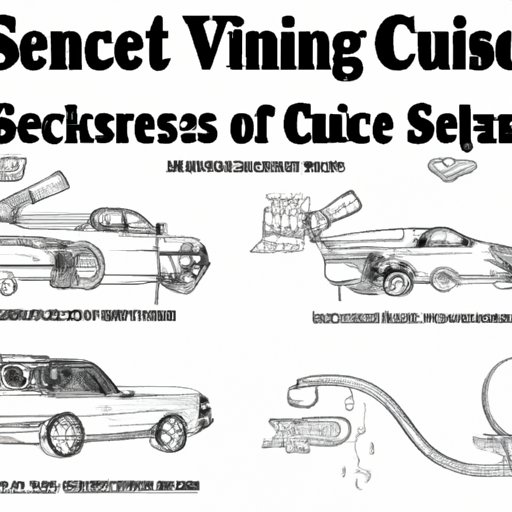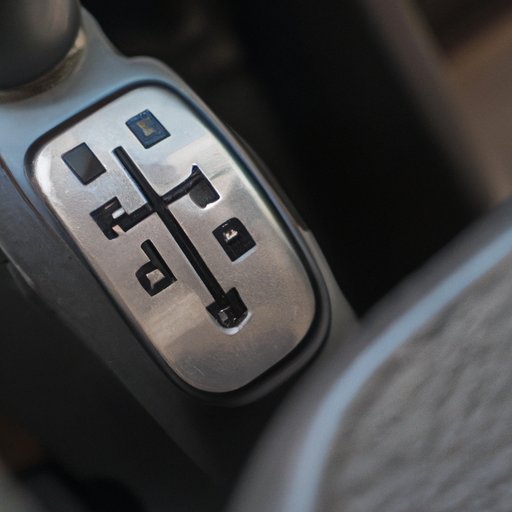I. Introduction
Do you hear an annoying squeaking sound every time you make a turn in your car? This is a common problem that many car owners face. Not only is it frustrating, but it could also indicate a more serious underlying issue. In this article, we will explore the 10 common causes of car squeaking when turning, ways to identify and fix the problem, and preventative measures to keep your car running smoothly.
II. 10 Common Causes of Car Squeaking When Turning
Here are 10 common reasons why your car may squeak when you turn:
1. Worn out brake pads
If your brake pads are worn out, they may produce a squeaking or grinding noise when you turn. This is due to the metal wear indicator rubbing against the rotor. You should replace your brake pads immediately to avoid further damage to your brakes.
2. Loose or damaged power steering belt
A loose or damaged power steering belt can also cause squeaking sounds when you turn. This is because the belt isn’t properly gripping the pulley, causing it to slip and make noise. Replacing or tightening the belt should fix the problem.
3. Worn out suspension components
If your car’s suspension components are worn out, they may produce a creaking sound when you turn. This could be due to worn out bushings, bearings, or other components. You may need to replace these parts to fix the problem.
4. Loosened or damaged wheel bearings
Wheel bearings help your car’s wheels rotate smoothly. When they become loose or damaged, they may produce a squeaking sound when you turn. You should have your wheel bearings checked and replaced if necessary.
5. Steering linkage issues
If your car’s steering linkage components are worn out or damaged, they may produce a clunking or squeaking sound when you turn. You should have your steering linkage checked by a professional mechanic.
6. Damaged ball joints
Ball joints allow your car’s suspension to move and absorb bumps in the road. When they become damaged, they may produce a squeaking or popping sound when you turn. You should have your ball joints checked and replaced if necessary.
7. Old shock absorbers
Shock absorbers help your car stay stable and absorb bumps on the road. When they become old or worn out, they may produce a squeaking sound when you turn. You may need to replace your shock absorbers to fix the problem.
8. Suspension spring problems
If your suspension springs are worn out or damaged, they may produce a squeaking or clunking sound when you turn. This is because the springs aren’t properly supporting the weight of the vehicle. You may need to replace your suspension springs to fix the problem.
9. Damaged CV joint
CV joints are an important part of your car’s drivetrain. When they become damaged, they may produce a clicking or popping sound when you turn. You should have your CV joints checked and replaced if necessary.
10. Over-tightened accessory belt(s)
If your car’s belts are over-tightened, they may produce a high-pitched squealing sound when you turn. This is because the belts are not properly moving over the pulleys. You should have your accessory belts checked and possibly replaced.
III. Don’t Ignore These Squeaks: Identifying and Fixing Car Noises
Identifying the root cause of your car’s squeaking noise(s) is key to avoiding further damage. Here are some things you should know:
Understanding different types of car noises
There are many different types of car noises, including squeaking, grinding, clunking, and popping sounds. Each of these noises can indicate a different problem with your car. Squeaking noises, for example, often indicate issues with suspension or steering components.
Identifying the root cause of the squeaks
Identifying the root cause of your car’s squeaking noise(s) can be difficult. However, you can start by listening carefully to the sound and trying to determine where it’s coming from. You can also inspect your car’s suspension, steering, and braking components for any signs of wear or damage.
Why you shouldn’t ignore the squeaking sound(s)
Ignoring squeaking sounds from your car can lead to further damage and potentially dangerous situations. For example, worn out brake pads can cause your brakes to fail, putting you and other drivers at risk. It’s important to address the issue as soon as possible.
IV. 5 DIY Solutions for Squeaky Car Problems
Here are some DIY solutions that may help fix your car’s squeaky problems:
1. Checking and topping off power steering fluid
If your car’s power steering fluid is low, it may cause squeaking sounds when you turn. Check your car’s owner’s manual to locate the power steering fluid reservoir and add fluid if necessary.
2. Lubricating various moving parts
Lubricating various moving parts can help reduce friction and eliminate squeaking sounds. Some parts that may need lubrication include suspension components, ball joints, and CV joints.
3. Tightening loose belts or bolts
If your belts or bolts are loose, they may cause squeaking sounds. Tightening them can help fix the problem. Be sure to check your car’s owner’s manual for the correct torque specifications.
4. Checking air pressure in tires
Low tire pressure can cause your tires to squeak when you turn. Check your car’s tire pressure and inflate them to the recommended level.
5. Replacing worn out parts (with guidance from manual)
Some worn out parts may need to be replaced to fix the squeaking sounds. Refer to your car’s owner’s manual to identify which parts need to be replaced and how to replace them.
V. Expert Recommendations: How to Diagnose and Repair Car Squeaks
If the DIY solutions above don’t help fix the squeaking sounds, you may need to take your car to a professional mechanic. Here’s what you should know:
Taking your car to a professional mechanic
Professional mechanics have the expertise and tools to diagnose and repair car squeaks. They can help identify the root cause of the sound and recommend the appropriate repair.
How to diagnose the exact issue
A professional mechanic will use diagnostic tools and techniques to identify the exact issue causing your car to squeak. They may inspect your car’s suspension, steering, and braking components and may test the car while driving to determine the issue.
Repair options and cost estimates
A professional mechanic will review repair options with you and provide cost estimates for each option. They can help you decide on the best course of action for your car and budget.
When to replace or repair certain parts
Some parts may need to be replaced rather than repaired, such as worn out brake pads or suspension springs. A professional mechanic can help you determine when it’s time to replace or repair certain parts.
VI. From Brake Issues to Power Steering: Reasons Your Car Squeaks When Turning
There are many underlying mechanical issues that can cause your car to squeak when turning. Here are some common reasons and recommended actions:
Explaining underlying mechanical issues
Worn out or damaged parts can cause friction and produce squeaking sounds. Understanding which parts are wearing out or damaged is key to fixing the problem.
How different car parts interact and cause squeaks
Car parts work together to produce movement and ensure stability. When one part becomes worn out or damaged, it can affect the performance of other parts, leading to squeaks and other issues.
Common reasons for squeaking and recommended actions
Common reasons for squeaking include worn out brake pads, loose or damaged power steering belts, and worn out suspension components. The recommended actions vary depending on the cause of the sound.
VII. Squeaky Wheels: How to Keep Your Car Running Smoothly
Preventative measures can help you avoid squeaks and keep your car running smoothly. Here’s what you can do:
Preventative measures to avoid squeaks
Regular maintenance, including changing your car’s oil and filters, can help prevent wear and tear on your car’s parts. You should also inspect your car’s brakes, suspension, and steering components regularly for any signs of damage or wear.
General maintenance tips to keep your car running smoothly
Keeping your car clean and parking in a covered area can help prevent rust and damage to your car’s exterior. You should also keep your tires inflated to the recommended level and rotate them regularly to ensure even wear.
Signs to look out for that indicate potential car issues
Some signs to look out for include squeaking or clunking sounds, difficulty steering, shaking or pulling while driving, and warning lights on your dashboard. If you notice any of these signs, you should have your car checked by a professional mechanic.

VIII. The Science Behind Car Squeaks: A Comprehensive Guide to Troubleshooting
Understanding the physics of how your car’s parts work together can help you troubleshoot squeaking sounds. Here’s what you need to know:
Understanding the physics of the mechanics
Car parts work together to produce movement and stability. Understanding how they interact can help you identify issues and fix them.
How different parts affect car movement
Different parts, such as brakes and suspension components, affect how your car moves and handles. If one part isn’t working properly, it can affect the performance of other parts.
Comprehensive guide to troubleshooting
Identifying the root cause of squeaking sounds can be difficult. However, by understanding the physics of how your car’s parts work and inspecting them regularly, you can troubleshoot issues and prevent further damage.
IX. Conclusion
Car squeaks when turning are a common issue that can indicate a more serious underlying problem. In this article, we explored the 10 common causes of car squeaking when turning, ways to identify and fix the problem, and preventative measures to keep your car running smoothly. Remember to regularly inspect your car’s suspension, steering, and braking components and consult a professional mechanic if you notice any issues. By taking action and fixing the issue early, you can avoid further damage and keep your car running smoothly.
